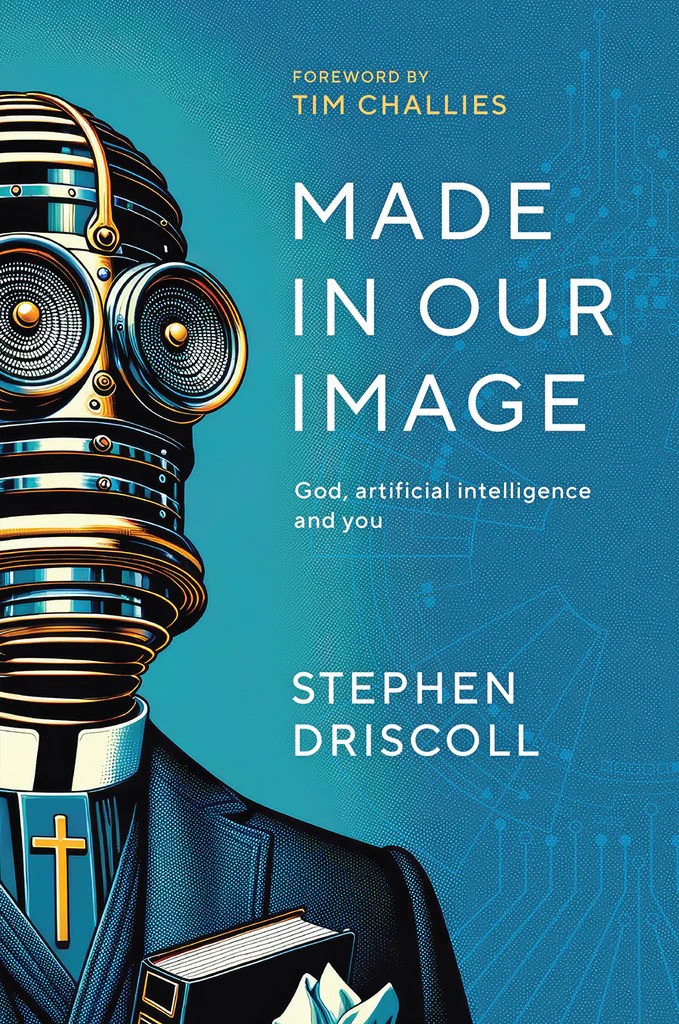Every now and then something of great significance happens. We call them revolutions because they completely reshape the way our world operates. According to Stephen Driscoll in his recent book, Made in Our Image, we’re on the brink of another one: the rise of artificial intelligence (AI). He contends we are facing ‘a transformative and lasting technological revolution. Something more like the wheel than the typewriter’ (3).
If you’re anything like me, AI has been a source of mild curiosity and amusement. We’re impressed by what it can do (retell the fall of the Roman empire in rap) and laugh at its catastrophic fails (AI image generation, need I say more?). But it wasn’t until I read this book that I realised I need to take AI much more seriously. Driscoll quotes cognitive scientist Douglas Hofstadter:
the progress, the accelerating progress, has been so unexpected … [to] not only myself, but many, many people, that there is a certain kind of terror of an oncoming tsunami that is going to catch all humanity off guard. (53)
Driscoll’s book is all about helping Christians swim in these rising waters.

Made In Our Image
Stephen Driscoll
Made In Our Image
Stephen Driscoll
Artificial intelligence is coming. How do Christians navigate their way through these momentous changes? What does Christianity have to say about this brave new world? What will living for Jesus look like in a world where humans, made in God’s image, coexist with intelligent machines made in our image?
Stephen Driscoll sets out to answer those questions with a deep dive into the intersection of faith and technology. Avoiding the extremes of both the tech worshippers and the ‘doomers’, Driscoll offers accessible and illuminating insights into the nature of AI, along with practical tips on how Christians might use this technology for good. Most of all, he shows how the deepest structures of biblical thought will equip Christians to live with AI.
(Re)Orienting the Reader
When I started reading, I came with two types of questions: the extremely practical (what can you use AI for? how do you use it morally?) and the extremely speculative (will AI rise up and take over the world?). Few of my questions were answered. But rather than expose a deficiency in the book, it exposed a deficiency in my questions.
Made in Our Image does something more profound than offer practical tips (which become obsolete as technology changes) or speculations into the far-flung future (which we cannot know). Instead, it seeks to establish a ‘framework of life, culture and technology’ (10) that can help us navigate the phenomenon of AI, irrespective of where the technology might lead.
The wisdom of this approach is the greatest strength of the book. Driscoll contends that what we need is ‘a clear sense of what matters to us, and of our place in God’s world, so that we can make sense of the future’ (26). As his case in point, he shows how an Amish community avoided the destructive impact of television on American community life, not because they had some prophetic insight or a blanket ban on technology, but because they had a clear sense of what mattered to them and what might threaten it.
The ultimate aim of the book, therefore, is not to give Christians moral directives, but a set of enduring biblical principles that will inform our interaction with AI, especially as it continues to change.
Establishing the Principles
Driscoll frames his discussion of AI around the biblical story of God’s dealings with the world and our place in it: creation, sin, cross, and new creation. This approach not only provides principles for approaching AI, but it also models a method that can be applied to other contemporary issues the Bible does not explicitly address.
- Under Creation, Driscoll considers the challenge AI presents for our understanding of human identity, and the necessity of founding our identity on who God made us to be.
- Under Sin, we’re shown that while technology is morally neutral, it can be used for good or evil, so we should be wary when it is put in the hands of sinful people.
- Under the Cross, we consider whether AI will help or harm humanity. The lack of consensus over human purpose and morality leaves the matter an open question. What we need is the cross, which challenges human attempts to (re)define morality and reveals the justice and mercy of God.
- Finally, under New Creation, Driscoll shows that while AI promises greater wealth, health and freedom than ever before, to treat it as a functional saviour distracts us from true utopia: fellowship with God and his people in the new creation.
These chapters are the meat of the book and are a remarkable blend of theological reflection, historical awareness, and cultural assessment. The breadth and depth of research is impressive. AI is never considered in isolation, but always against its historical and technological background. In this sense, the book could just as easily be described as offering a Christian’s response to technology or culture change, or even an outline of biblical theology, with AI its recurring and primary illustration.
My Assessment
Made In Our Image is not without its weaknesses. I found the chapter on the cross unclear. It was the most speculative regarding the possible impact of AI, and while it provided an excellent discussion of human purpose and morality, it left me wondering what principles the cross provided and how they applied to AI in particular.
This was exacerbated by long chapters and the absence of chapter summaries. Rather than examining principles one-by-one, Driscoll’s approach is to situate the reader in a story from which the principles can be derived along the way. As a result, I found I needed to review each chapter to explicitly articulate the journey Driscoll maps out.
Notwithstanding these points, it’s remarkable how well Driscoll integrates strands of history, culture, and theology, and in a way that remains accessible, readable, and enriching. It truly is an excellent book.
A Unique Opportunity
So often Christian writing is reactive. We write in response to societal changes and chart ways ahead only after the dust has settled and we’ve had time to make sense of what’s happened. But not only has Driscoll given us a high-quality work of theology, he’s given it to us at a time where we can most fruitfully use it.
Given that most of us found ourselves ill-prepared for technological innovations like the internet, social media, and the smart phone, this book is particularly valuable and gives us an advantage that we’d be foolish to ignore. I recommend it especially for those whose responsibility is the teaching and care of younger generations.
Both Matt Smith and Stephen Driscoll work for AFES.














